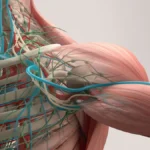Introduction
Hypertrophic cardiomyopathy (HCM) is a complex and often misunderstood condition that affects the heart muscle. This genetic disorder is one of the most common forms of cardiomyopathy and can occur in people of all ages. Characterized by the thickening of the heart muscle (myocardium), particularly in the ventricles, HCM can lead to various complications, including heart failure, arrhythmias, and even sudden cardiac death. Understanding hypertrophic cardiomyopathy is essential for early diagnosis and effective management, making a significant impact on patients’ quality of life.
What is Hypertrophic Cardiomyopathy?
Hypertrophic cardiomyopathy is a condition in which the heart muscle becomes abnormally thick. Unlike other heart diseases caused by lifestyle factors such as poor diet or lack of exercise, HCM is typically inherited. The thickened heart muscle can make it harder for the heart to pump blood efficiently, especially when the septum (the wall dividing the left and right ventricles) is involved. This leads to reduced blood flow from the heart and can result in various symptoms ranging from mild to severe.
Causes of Hypertrophic Cardiomyopathy
Hypertrophic cardiomyopathy is predominantly caused by genetic mutations. These mutations affect the proteins in the heart muscle that are responsible for contraction. Here are some primary causes:
- Genetic Factors:
- The most common cause of HCM is a mutation in one or more genes that control heart muscle development. It is inherited in an autosomal dominant pattern, meaning that a child has a 50% chance of inheriting the condition if one parent carries the gene mutation.
- Family History:
- Having a close relative with HCM significantly increases the risk of developing the condition. Genetic testing can help identify the presence of these mutations, even before symptoms appear.
- Other Contributing Factors:
- While genetic mutations are the main cause, other factors such as high blood pressure or age-related changes in the heart may exacerbate the condition in individuals with genetic susceptibility.
Symptoms of Hypertrophic Cardiomyopathy
Symptoms of hypertrophic cardiomyopathy can vary widely. Some individuals may be asymptomatic, while others may experience severe, life-threatening complications. Common symptoms include:
- Shortness of Breath:
- Due to the thickened heart muscle, the heart struggles to pump blood effectively, leading to reduced oxygen delivery and causing shortness of breath, especially during physical activity.
- Chest Pain:
- Chest pain, particularly during exercise, is a common symptom as the heart muscle’s oxygen demand exceeds its supply.
- Palpitations:
- Patients often experience a fluttering or pounding heartbeat, which can be caused by arrhythmias.
- Fainting or Dizziness:
- Reduced blood flow and abnormal heart rhythms can lead to fainting spells, particularly during exertion.
- Fatigue:
- Chronic fatigue is a frequent complaint, stemming from the heart’s inability to pump enough blood to meet the body’s needs.
- Sudden Cardiac Arrest:
- In severe cases, HCM can lead to sudden cardiac arrest, especially in young athletes during intense physical activity.
Diagnosing Hypertrophic Cardiomyopathy
Early diagnosis is crucial for managing hypertrophic cardiomyopathy and preventing severe complications. A combination of physical examinations, patient history, and various diagnostic tests is used to confirm HCM. Common diagnostic methods include:
- Echocardiogram:
- This is the most common and effective tool for diagnosing HCM. It uses ultrasound waves to create images of the heart, allowing doctors to see the thickened heart muscle and assess its function.
- Electrocardiogram (ECG):
- An ECG records the electrical activity of the heart and can help detect abnormal heart rhythms associated with HCM.
- Genetic Testing:
- Genetic tests can identify mutations in genes associated with hypertrophic cardiomyopathy, aiding in early detection, especially in families with a history of the disease.
- Cardiac MRI:
- Cardiac MRI provides detailed images of the heart structure, helping to identify the extent and location of the thickening.
Treatment Options for Hypertrophic Cardiomyopathy
The treatment of hypertrophic cardiomyopathy focuses on managing symptoms, preventing complications, and improving the patient’s quality of life. Options may include medications, lifestyle changes, and surgical procedures.
- Medications:
- Beta-blockers and calcium channel blockers are commonly prescribed to help relax the heart muscle, reduce heart rate, and improve blood flow.
- Antiarrhythmic drugs may be used to manage irregular heart rhythms.
- Lifestyle Modifications:
- Avoiding strenuous exercise and competitive sports can help reduce the risk of sudden cardiac arrest.
- Regular monitoring and check-ups are essential for managing the condition effectively.
- Surgical Procedures:
- Septal Myectomy: This open-heart surgery involves removing a portion of the thickened septum to improve blood flow and reduce symptoms.
- Alcohol Septal Ablation: This minimally invasive procedure involves injecting alcohol into the septal artery to shrink the thickened heart tissue.
- Implantable Cardioverter Defibrillator (ICD): An ICD may be implanted in patients at high risk of sudden cardiac arrest to monitor the heart and deliver shocks if a life-threatening arrhythmia occurs.
- Advanced Therapies:
- In severe cases where other treatments are ineffective, heart transplant may be considered.
Living with Hypertrophic Cardiomyopathy
Living with hypertrophic cardiomyopathy can be challenging, but with proper management and care, many patients lead full, active lives. It is vital for patients to work closely with their healthcare providers, adhere to treatment plans, and make lifestyle adjustments to reduce risks. Emotional support from family, friends, and support groups can also play a crucial role in coping with the condition.
Conclusion
Hypertrophic cardiomyopathy is a serious yet manageable heart condition. With advancements in genetic testing, imaging techniques, and treatment options, early diagnosis and intervention have become more effective. Awareness and understanding of hypertrophic cardiomyopathy can empower individuals to seek timely medical attention, potentially preventing life-threatening complications. For those living with HCM, continuous monitoring and a comprehensive care plan are essential in maintaining a good quality of life.
Get more info : https://www.timelinetale.com/







